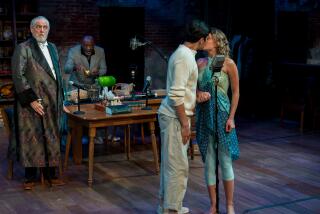‘Duchess’ of Truly Noble Parentage
- Share via
While panning for curiosities in the library of the California Institute of the Arts, Denise Gillman struck theatrical gold: Bertolt Brecht and W.H. Auden’s adaptation, hitherto unproduced, of John Webster’s “The Duchess of Malfi.”
Commissioned for Broadway in the 1940s, most of the adaptation was nixed by the play’s then-director, and it has languished ever since. Now, Auden and Brecht’s work can be seen at Theatre of NOTE, in a NOTE co-production with Pilgrimage Theatre.
Auden and Brecht’s incisive collaboration, which incorporates Auden’s own epilogue and alters the ending to focus more on the duchess’ sad fate, is the real star of the evening. Gillman, who directs a solid cast, has the great good sense to let the language do much of the work for her. Her austere and measured staging, blessedly devoid of histrionics, allows the text to shine forth without meretricious adornment.
The Cardinal of Ancono (David Conner) is opposed to the remarriage of his widowed young sister, the Duchess of Malfi (Trace Turville). The cardinal craves his sister’s vast estates, which would become her husband’s upon her remarriage. Her other brother, Ferdinand (Andre Marrero), the Duke of Calabria, also opposes a second marriage--but for different reasons. Ferdinand has been incestuously fixated upon his sister since childhood, and his obsession has now grown to madness.
When the duchess secretly weds her steward Antonio (Peter Konerko), Ferdinand’s spy Daniel de Bosola (Kiff Scholl) rats her out with spectacularly sanguinary consequences.
First performed in 1619, Webster’s Jacobean masterwork reflects the creeping incursion of Puritanism in England. A favorite target of the Puritans, the theater had already come under strict controls. A crafty practitioner, Webster echoed the Puritan emphasis on underlying evil while also imbuing his piece with blood and thunder sensationalism.
For all its studied salaciousness, the play remains a torturous journey into the heart of darkness. Yet, in this adaptation, there are frequent stops for humor, black though it might be. One can almost distinguish the collaborators’ distinct voices: In the up-front emphasis on the theme of incest, we hear the alienated overtones of Brecht; in the waggishly ironical commentary on evil, Auden.
Philip Mooers’ lighting design, Gina Davidson’s costumes and Douglas Ridgeway’s props and set are all suitably subdued and in period. Marrero is frighteningly forceful yet vulnerable as the mad Ferdinand, while Scholl has a heyday as the gleefully backstabbing Bosola. As the duchess, Turville has a flatly American, almost idiomatic dialect that is initially distracting. However, Turville’s emotions are so genuine, her portrayal so close to the bone, that she emerges as a towering and tragic figure--Webster’s early warning against insidious repression.
BE THERE
“The Duchess of Malfi,” Theatre of NOTE, 1517 Cahuenga Blvd., Hollywood. Thursdays-Saturdays, 8 p.m. Ends Sept. 5. $10-$12. (213) 856-8611. Running time: 2 hours, 40 minutes.
More to Read
The biggest entertainment stories
Get our big stories about Hollywood, film, television, music, arts, culture and more right in your inbox as soon as they publish.
You may occasionally receive promotional content from the Los Angeles Times.










